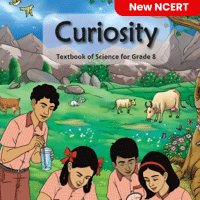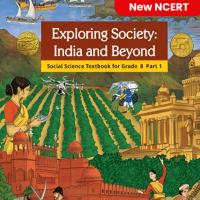Class 8 Exam > Class 8 Questions > When Major H.P.S. Ahluwalia stood on the summ...
Start Learning for Free
When Major H.P.S. Ahluwalia stood on the summit of Everest, what was the dominant emotion he felt?
- a)Jubilation and excitement
- b)Humility
- c)Sadness and regret
- d)Relief and satisfaction
Correct answer is option 'B'. Can you explain this answer?
Most Upvoted Answer
When Major H.P.S. Ahluwalia stood on the summit of Everest, what was t...
Dominant Emotion on Everest Summit
When Major H.P.S. Ahluwalia reached the summit of Everest, the emotion he primarily felt was humility. This feeling can be understood through several key aspects:
Respect for Nature
- Standing at the highest point on Earth, Ahluwalia was likely overwhelmed by the sheer magnitude and beauty of the Himalayas.
- The vastness and power of nature often evoke a sense of humility, reminding climbers of their smallness in comparison to the natural world.
Recognition of Challenges
- Climbing Everest is not just a physical challenge but also a mental and emotional one.
- Ahluwalia would have reflected on the struggles, sacrifices, and teamwork involved in achieving this feat, which fosters a sense of humility.
Tribute to Fellow Climbers
- Many climbers have faced hardships, and some have tragically lost their lives in pursuit of this dream.
- Ahluwalia's achievement would have been tinged with respect for those who came before him and the risks they faced.
Gratitude
- The summit experience often brings a deep sense of gratitude for the opportunity to attempt such a monumental climb.
- Humility allows climbers to appreciate the support from their teams, families, and the climbing community.
In conclusion, Major H.P.S. Ahluwalia's dominant emotion of humility upon reaching Everest's summit reflects a profound respect for nature, recognition of the challenges faced, tribute to fellow climbers, and a deep sense of gratitude.
When Major H.P.S. Ahluwalia reached the summit of Everest, the emotion he primarily felt was humility. This feeling can be understood through several key aspects:
Respect for Nature
- Standing at the highest point on Earth, Ahluwalia was likely overwhelmed by the sheer magnitude and beauty of the Himalayas.
- The vastness and power of nature often evoke a sense of humility, reminding climbers of their smallness in comparison to the natural world.
Recognition of Challenges
- Climbing Everest is not just a physical challenge but also a mental and emotional one.
- Ahluwalia would have reflected on the struggles, sacrifices, and teamwork involved in achieving this feat, which fosters a sense of humility.
Tribute to Fellow Climbers
- Many climbers have faced hardships, and some have tragically lost their lives in pursuit of this dream.
- Ahluwalia's achievement would have been tinged with respect for those who came before him and the risks they faced.
Gratitude
- The summit experience often brings a deep sense of gratitude for the opportunity to attempt such a monumental climb.
- Humility allows climbers to appreciate the support from their teams, families, and the climbing community.
In conclusion, Major H.P.S. Ahluwalia's dominant emotion of humility upon reaching Everest's summit reflects a profound respect for nature, recognition of the challenges faced, tribute to fellow climbers, and a deep sense of gratitude.
Free Test
FREE
| Start Free Test |
Community Answer
When Major H.P.S. Ahluwalia stood on the summit of Everest, what was t...
When Major H.P.S. Ahluwalia stood on the summit of Everest, the dominant emotion he felt was humility. Despite the physical relief and thankfulness, there was a tinge of sadness, possibly because he pondered if there would be nothing higher to climb and all paths henceforth would lead downward. This mix of emotions reflects the profound impact of reaching such a monumental peak, as described in his reflections on the experience.

|
Explore Courses for Class 8 exam
|

|
Question Description
When Major H.P.S. Ahluwalia stood on the summit of Everest, what was the dominant emotion he felt?a) Jubilation and excitementb) Humilityc) Sadness and regretd) Relief and satisfactionCorrect answer is option 'B'. Can you explain this answer? for Class 8 2025 is part of Class 8 preparation. The Question and answers have been prepared according to the Class 8 exam syllabus. Information about When Major H.P.S. Ahluwalia stood on the summit of Everest, what was the dominant emotion he felt?a) Jubilation and excitementb) Humilityc) Sadness and regretd) Relief and satisfactionCorrect answer is option 'B'. Can you explain this answer? covers all topics & solutions for Class 8 2025 Exam. Find important definitions, questions, meanings, examples, exercises and tests below for When Major H.P.S. Ahluwalia stood on the summit of Everest, what was the dominant emotion he felt?a) Jubilation and excitementb) Humilityc) Sadness and regretd) Relief and satisfactionCorrect answer is option 'B'. Can you explain this answer?.
When Major H.P.S. Ahluwalia stood on the summit of Everest, what was the dominant emotion he felt?a) Jubilation and excitementb) Humilityc) Sadness and regretd) Relief and satisfactionCorrect answer is option 'B'. Can you explain this answer? for Class 8 2025 is part of Class 8 preparation. The Question and answers have been prepared according to the Class 8 exam syllabus. Information about When Major H.P.S. Ahluwalia stood on the summit of Everest, what was the dominant emotion he felt?a) Jubilation and excitementb) Humilityc) Sadness and regretd) Relief and satisfactionCorrect answer is option 'B'. Can you explain this answer? covers all topics & solutions for Class 8 2025 Exam. Find important definitions, questions, meanings, examples, exercises and tests below for When Major H.P.S. Ahluwalia stood on the summit of Everest, what was the dominant emotion he felt?a) Jubilation and excitementb) Humilityc) Sadness and regretd) Relief and satisfactionCorrect answer is option 'B'. Can you explain this answer?.
Solutions for When Major H.P.S. Ahluwalia stood on the summit of Everest, what was the dominant emotion he felt?a) Jubilation and excitementb) Humilityc) Sadness and regretd) Relief and satisfactionCorrect answer is option 'B'. Can you explain this answer? in English & in Hindi are available as part of our courses for Class 8.
Download more important topics, notes, lectures and mock test series for Class 8 Exam by signing up for free.
Here you can find the meaning of When Major H.P.S. Ahluwalia stood on the summit of Everest, what was the dominant emotion he felt?a) Jubilation and excitementb) Humilityc) Sadness and regretd) Relief and satisfactionCorrect answer is option 'B'. Can you explain this answer? defined & explained in the simplest way possible. Besides giving the explanation of
When Major H.P.S. Ahluwalia stood on the summit of Everest, what was the dominant emotion he felt?a) Jubilation and excitementb) Humilityc) Sadness and regretd) Relief and satisfactionCorrect answer is option 'B'. Can you explain this answer?, a detailed solution for When Major H.P.S. Ahluwalia stood on the summit of Everest, what was the dominant emotion he felt?a) Jubilation and excitementb) Humilityc) Sadness and regretd) Relief and satisfactionCorrect answer is option 'B'. Can you explain this answer? has been provided alongside types of When Major H.P.S. Ahluwalia stood on the summit of Everest, what was the dominant emotion he felt?a) Jubilation and excitementb) Humilityc) Sadness and regretd) Relief and satisfactionCorrect answer is option 'B'. Can you explain this answer? theory, EduRev gives you an
ample number of questions to practice When Major H.P.S. Ahluwalia stood on the summit of Everest, what was the dominant emotion he felt?a) Jubilation and excitementb) Humilityc) Sadness and regretd) Relief and satisfactionCorrect answer is option 'B'. Can you explain this answer? tests, examples and also practice Class 8 tests.

|
Explore Courses for Class 8 exam
|

|
Signup for Free!
Signup to see your scores go up within 7 days! Learn & Practice with 1000+ FREE Notes, Videos & Tests.


















